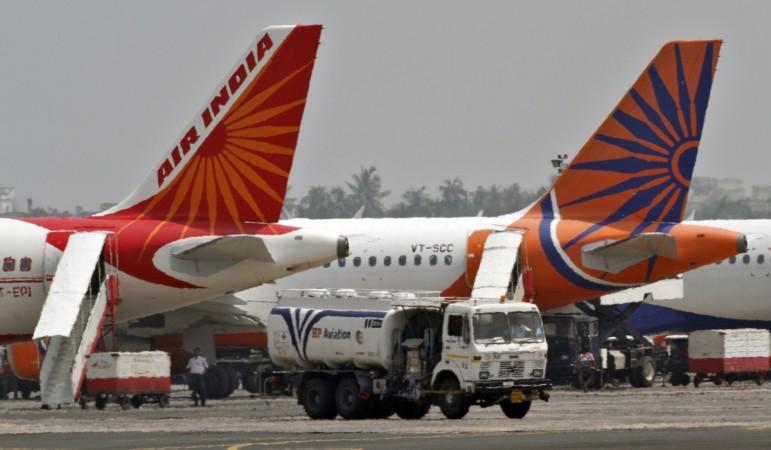
For an important parliamentary panel, the appropriate time for Air India privatisation hasn't yet arrived. Are they a bunch of incorrigible optimists or just those nonchalant 'beltway' spendthrifts who love to splurge largesses on their own ilk?
The Parliamentary Standing Committee on Transport, Tourism and Culture said in its draft report the taxpayers should continue to underwrite the losses of the decadent business that stopped returning profits -- and serving the nation -- ages ago.
In 2012, the Manmohan Singh government ruled out privatisation of Air India and instead announced a plan under which Rs 30,000 crore would be funnelled into the company over a ten-year period to revive and turn it around. At the halfway mark of the costly turnaround plan, the fortunes of the withering behemoth aren't looking up. It's still wallowing in the quicksands of debt and corporate inefficiency.
It wasn't the first time that divestment of the carrier was on the table. The Air India sale came up as an option at the turn of the century but was put on the backburner, leading to huge losses, debt pile-up and bailouts while the white elephant remained a haven of red tape, lethargy, apathy and mismanagement.
The parliamentary panel highlights the operational profits the national carrier made last year. But it conveniently forgets the fact that the meagre operational profits were a result of a continued softness in the global oil markets.
Those blips on the bottom line were not brought around by any miraculous operational efficiency displayed by its 30,000 strike-prone, heavily unionised and combative workforce that loves grounding flights and skipping schedules at the drop of a hat. And, despite the operational profits the panel brags about, the sinking airline, which hasn't reported net profits in the last ten years, continued to accumulate losses running into thousands of crores.
All whimsical 'turnaround' plans by successive governments have involved the infusion of funds, generous loan guarantees and sometimes even the commitment to repay interest on outstanding loans. All this for the love of the idea of a national carrier? If the parliamentary panel has its way the government will end up funnelling another Rs 20,000 crore of good money after the bad. More taxpayer money down the drain, and with no logical end in sight to the problem.
According to the estimates of Centre for Asia Pacific Aviation (CAPA), the postponement of Air India divestment will also further lead to the erosion of investor interest. "Parliamentary panel recommending divestment of Air India be postponed by 5 years will further erode its value. CAPA estimates that the government would need to inject additional $2.5-3bn funding, and these may be conservative estimates," Kapil Kaul, Chief Executive of CAPA, said, according to NDTV.
The civil aviation ministry itself admitted some time back that it doesn't know if anyone will be interested in buying the airline sitting on top of an explosive debt load and a decadent legacy.
How bad is Air India's debt burden?
Air India carries a debt pile of Rs 52,000 crore. Of this, about Rs 22,000 crore is estimated to be aircraft loans while the bulk of the debts emanate from operational costs gathered over years of mismanagement. Such a huge debt overhang, coupled with the legacy work culture, is a major deterrent for a straight-laced privatisation bid.
In October, there were reports by the Economic Times that the government would be willing to absorb a large chunk of the debt, yet again, to make the rickety company attractive to suitors. This debt offloading would incur the government a cost of about Rs 33,000 crore.
The Parliamentary panel unabashedly vouches for another round of loan write-off. That's hardly the solution. Air India should be allowed to go bankrupt, let its massive real estate assets in major metropolises be sold or auctioned to repay debts. The taxpayers, the banks and the investors in the banking sector don't have to be scapegoats anymore. It's an age-old thought, but when will the government finally move out of managing businesses that are better run in the private sector?
Instead of talking about writing off the debts of the deadwood company and propping up its bloated establishment further, the banks should be allowed to seize the mortgaged properties, sell or auction them off to recoup their non-performing assets. If this doesn't happen sooner, more loan write-offs and costly recapitalisations will ensue, eventually bleeding the public exchequer which in turn has to be replenished with more taxes. Mix this with the latest guidance envisaged in the FRDI bill aimed at resolving 'bad debt' in the system, and it's clear who is going to bear the brunt.
Complete privatisation
While complete privatisation makes sense, the civil aviation ministry has been dead against such a move. The finance ministry is in favour of offloading the entire stake and leaving the Maharaja in the hands of private players. The Niti Ayog supports this line too. The third option is for the government to keep a stake in the carrier while it cedes control to the private owners.
The government should go ahead with the privatisation of the airline without losing further time. The Cabinet Committee on Economic Affairs had given the nod for privatisation earlier this year. Now, the parliamentary panel's reasons for putting off the divestment are hogwash. It claims Air India's worth is larger than its business utility and offsets the onerous public burden the company passes on to the government every year. It even says the airline is useful at times of natural calamities! Overall, the sloppy text put out by the panel is a litany of shameless excuses and brash apology for a public burden.









!['Had denied Housefull franchise as they wanted me to wear a bikini': Tia Bajpai on turning down bold scripts [Exclusive]](https://data1.ibtimes.co.in/en/full/806605/had-denied-housefull-franchise-they-wanted-me-wear-bikini-tia-bajpai-turning-down-bold.png?w=220&h=138)



